
EVCLO vs FCLO – Watery Periods – Regulating Menstruation Naturally – Darker Yolks = Better Nutrition? – Organic Honey not Safe? – Travelling with an Infant
When we moved into our quirky canyon home nearly seven years ago, I immediately knew it needed one thing – a cedar wood soaking tub, the perfect place to connect to the beautiful natural surroundings. This month, my renaissance man hubby made my dream come true by building this one (pictured above) in our backyard. So now until forever, you can mostly find me here.
While I've been soaking, my inbox runneth over with questions from readers wondering – What would Emily do – about Real food and holistic health topics. I’ve created this Q&A to get your questions answered and for other folks to benefit from the answers too.
Who am I to know the answers to your questions?
I’m a holistic-minded mom, a sometimes beach bum, a real food foodie, a curious health researcher, and I’ve been practicing holistic and Chinese medicine for over a decade. That said, the answers here are only my opinion, and shouldn’t be construed as medical advice.
If you read something here and have your own wisdom or opinion to add, by all means, please leave a comment so we can all benefit from your experiences and perspective.
Okey dokey! Let’s dive in…
Question 1: The difference between EVCLO and FCLO
Sevie asks…
What is the difference between extra virgin cod liver oil and fermented cod liver oil? Are the ratios of Vitamin A to D the same? I know that synthetic cod liver oil is different. No one has been able to answer this for me. TIA!
Hi Sevie, in its unadulterated form, cod liver oil should have ratios of vitamin A to D of about 5:1. This stands whether it's fermented or virgin.
I love the extra virgin cod liver oil (you can get EVCLO here), but it is far more expensive and does not come in capsules. My family continues to take fermented cod liver oil for these reasons (you can get FCLO here), but those who don't mind the liquid or are particularly sensitive to the fermentation element may find EVCLO to be their best choice.
Most other brands of cod liver oil should be avoided, as they are processed in such a way that the vitamins are destroyed and then added back in synthetic form in the incorrect ratio.
Learn more about the benefits of cod liver oil in the post.
Question 2: What does a watery period mean?
Gabrielle wants to know…
At about day 2 of my cycle, my flow turns very watery. I use a Diva Cup, and I have to empty it every couple hours (sometimes more), and the flow often leaks out because it is so watery. I am 37, I had one (successful) pregnancy 10 years ago, and I'm definitely not pregnant now. My diet is probably 70% WAPF, I take no medications/pharmaceuticals, and my stress management/exercise/time outside is meh. I have no other unusual menstrual symptoms.
Have you ever seen anything like this in your practice? Where can I go for more information?
Hi Gabrielle, thanks for your question. Unfortunately, not knowing more about your case and not being your healthcare practitioner limits me in being able to diagnose or recommend treatment. Generally speaking and from a Chinese Medicine perspective, watery flow is often caused by Blood deficiency and may be accompanied by fatigue, slow metabolism, digestive issues, or anxiety. Certainly life as a busy mom could contribute to this.
I recommend working with a Chinese medicine practitioner who can properly assess your case. If you do receive this diagnosis, foods that can help the body “build Blood” include liver, meat, bone broth, eggs – all from organic, pasture-raised sources of course – and dark leafy greens. Chinese herbal formulas are also excellent for addressing this condition.
Question 3 – Regulate menstrual periods without drugs
Carolyn wants to know…
How can I regulate my menstrual periods without resorting to taking birth control pills?
Hi Carolyn – I would suggest you read this book – Quit PMS by Lauren Geertsen. While the title indicates it is about treating premenstrual syndrome, the book is actually all about naturally regulating hormones without medical intervention.
Question 4: Color of eggs yolks always = quality?
Erica writes…
Do darker yolks ALWAYS indicate better nutritional value? I purchased eggs online, which seemed to have great claims (organic, green pastures in summer and leafy green alfalfa in winter, soy/corn free, truly pastured), but when compared to the local eggs (and even the organic, cage-free eggs that I have purchased at Walmart!), the yolks of the pastured eggs were quite pale. How do I know if I'm getting good eggs?
Great question, Erica. In general, the rule is that the darker the yolks, the higher the nutritional value is. But then, the longer an egg sits, the lighter the yolks become.
Doesn't this mean that eggs lose some nutrition over time? Probably. This is another great example of why it's so important to know your farmer – and whenever possible – choose local.
Given the options, I'd go first for pastured and local, then a toss up between local free-range organic or pastured but shipped from afar weighing our factors of convenience, cost, and nutrition.
For those who are still baffled by choosing the best eggs (or just grab a dozen and hope for the best), you can learn how to decode egg labels in this post.
Question 5 – Even organic honey isn't safe?
Sara is concerned…
I heard that even organic honey has been found to have glyphosates (herbicide) in it. This is really making me worry about including honey in my family's diet. Here is the article I saw it in. What do we do?
Hi Sara – It is becoming increasingly more challenging to avoid herbicides and pesticides altogether. This is all the more reason that we should have a connection to where our food is coming from, how it is raised/produced, and the impact it may be having on our environment.
Simply buying organic honey is not enough. Our best contribution to positive change is to develop relationships with small farmers/producers who care deeply about the quality of their products. This won't guarantee that there are no herbicide residues in your food, but it will go much farther in voting with our food dollars for more non-toxic food sources (and a less toxic world).
Read about the health benefits of local raw honey in this post.
Question 6 – Baby gets sick when traveling
Jes needs advice…
My daughter is 7 1/2 months old and we are flying to Thailand (10 hour flight) in 3 months. We have done the flight twice already (once at 4 months old and then again at 6 months old). My daughter got sick, congested, and grumpy for a week after each flight. She is not breastfed and is currently still refusing solid foods.
Is there something in particular I could be doing in the weeks prior that would lessen the chances of her becoming sick? Any advice would be much appreciated.
Hi Jes – Thanks for the question. Traveling can be quite hard with little ones. Click here to get my free ebook – The Holistic Squid Immune Boosting Protocol, which is the method I use for my family and recommend to patients for protecting against illness whether home or traveling.
Also, when my family travels I also bring along my holistic travel remedy kit. Read this post to learn how to stock and use yours.
Got questions about real food or holistic health and wondering W.W.E.D.?
If you have a question for me, please first use the handy dandy search bar at the top righthand corner of this site. If that doesn’t give you the answers you need, email [questions at holisticsquid dot com].
I can’t guarantee that I will get to every single question, but I will do my best (with a priority for questions that will serve the most of the Holistic Squid community).
Also, keep in mind that I cannot and will not give you medical advice over the internet. It’s inappropriate and unethical. If you want my medical opinion about a health or nutritional issue for you or your child, I take virtual patient consultations on a limited basis via phone or Skype. You can find out more about my distance consultations here.
Got answers not included here?
Please leave them in the comments below!
 How your lifestyle may be inhibiting your ability to conceive – and what to do about it
How your lifestyle may be inhibiting your ability to conceive – and what to do about it
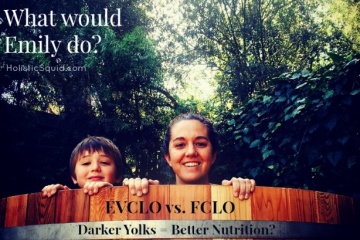
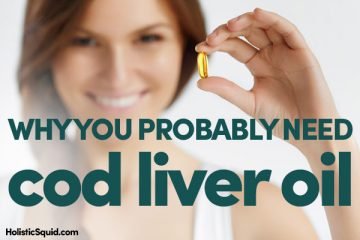
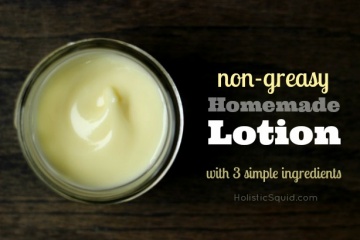
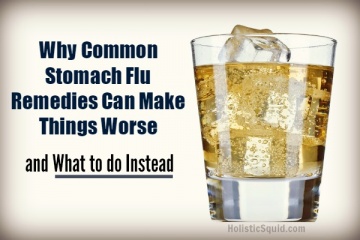
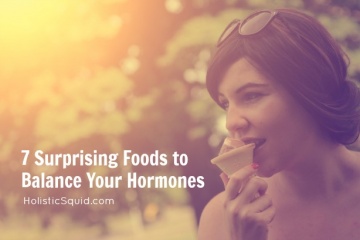

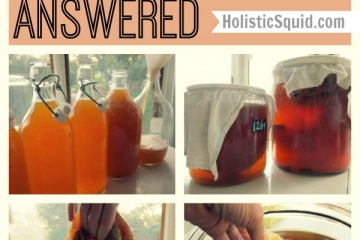

Thank you so much for answering my question, Emily! I hadn’t thought about eggs losing some nutrition over time. Thankfully my husband’s family’s chickens are laying again, so we have a source of awesome, fresh eggs.
I’m sort of an old school Mennonite type and do VERY LIMITED internet, but divinely found you. Since I do not follow Internet communications (blogs/chats, etc.) can you Emily (OR ANYBODY!) please (EMAIL) me directly any ALL NATURAL and safe ways to treat water in a therapy pool (1500 gal)? I have rheumatoid and refuse pills or shots. I have been trying to find out if ONLY sea salts, Epsom salts, vinegar, baking soda or essential oils, herbs in sachets or ANYTHING natural will keep my water safe to be in (heads underwater at times) AND that will also keep Mosquitos out! My water will be protected from direct sun (shaded), but I know something must be put in to keep Mosquitos from breeding! I do NOT want to use anything like chlorine or its chemical alternative beginning with the letter B. I don’t want fish in it as I don’t feel that is safe water in 1500 gal (in case my grandchildren MUST get in). I don’t want to accidentally ingest concentrated fish poo either. THANK YOU from the bottom of my heart if you can help. I am planning on getting a cheap therapy pool soon and I’ve wanted (needed) one for over a decade. Sincerely, Rose Thompson of Buchanan Dam TX
Whoops, forgot to edit out my real full name like my daughter told me to AND I guess public couldn’t see my email address. I told y’all I am old school AKA VERY Internet and technology ignorant! Sorry.
If anybody can help advise how to naturally treat my small therapy pool’s water, I’d be extremely grateful. Thanks and God bless, Rose
My email is rosvitat@gmail.com
Hi Emily,
I’ve recently been introduced to your blog by a fellow acupuncturist and so appreciating your breadth of knowledge! I’m curious what your thoughts are on raw milk and possibility of bacterial contamination (ie. e coli). My apologies if you’ve already written about this topic!
Thank you!
Gail
L.Ac. Seattle, WA
Hi Gail, I am so glad you are enjoying the blog. Here’s everything I have to say about milk and my resources 😉 I hope it helps!